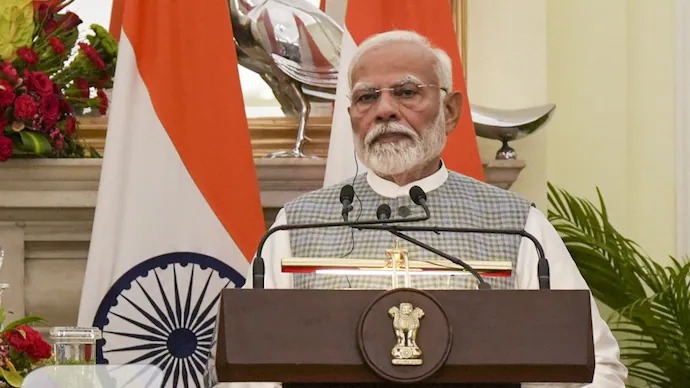By Our Correspondent
NEW DELHI – Prime Minister Narendra Modi’s latest decision to skip the Summit of the Shanghai Cooperation Organisation (SCO), to be held in Kazakhstan next month, seems to have shattered his image of an influential world leader carefully built up by his supporters over the last 10 years. Modi’s inability to understand the issues of India’s foreign policy has made a new addition to the diplomatic goof-up while dealing with the significant international event.
Modi has decided not to travel to Astana, Kazakhstan, for the summit to be held on July 3 and 4, although he had earlier confirmed his presence, and an advance security team had conducted its reconnaissance survey there. External Affairs Minister S. Jaishankar is expected to officiate in his place, according to the official sources.
The miscalculation of the Prime Minister’s Office for non-participation in the SCO summit has come just at the beginning of Modi’s third consecutive term. It has also proved the hollowness of the image of a global statesman built around Modi, with his blind supporters claiming that he had prevailed upon Russia to briefly stop the war in Ukraine to evacuate Indian students and asked Israel to go slow in its attacks on Gaza during Ramzan.
The Indian leadership’s failure to interact with the Central Asian countries and lack of involvement in the regional security policies through the SCO will have long-term implications for the country’s foreign policy, which has tilted towards the United States of America and Israel during the last 10 years of Bharatiya Janata Party’s rule. Modi’s visit to Italy last week to attend the G-7 Summit, where India is not a member, has already turned out to be a fiasco.
The summit hosted by Kazakh President Kassym-Jomart Tokayev is expected to include Russian President Vladimir Putin, Chinese President Xi Jinping, Central Asian leaders and Pakistan Prime Minister Shehbaz Sharif. Modi’s decision to miss the SCO Heads of State Council in Astana could also have a bearing on India’s participation in the SCO Heads of Government conference due to be held in Islamabad later this year, which Pakistan will host.
The official sources have cited the Parliament session, which started on June 24 and will continue till July 3, as the factor responsible for Modi’s decision, but the real reason lies somewhere else. In addition to the Speaker’s election and the President’s address to both Houses, the Prime Minister is expected to reply to the debate on the motion of thanks to the President in the Lok Sabha and the Rajya Sabha between July 2 and 4.
The SCO, originally a Eurasian security and economic grouping promoted by Russia and China in 2001, includes Kazakhstan, Kyrgyzstan, Tajikistan, Uzbekistan, India and Pakistan as full members. Iran and Belarus will be inducted this year. Modi’s absence at the SCO summit, despite the presence of other international leaders, is likely to raise questions over India’s commitment to the grouping which it joined just seven years ago as a full member.
Modi had visited Kazakhstan to attend the SCO summit in 2017, but the setting has become more troublesome for India over the past few years. India’s tensions with Pakistan, which also was inducted in 2017, have often been the chief irritant at the conference, with leaders of both countries taking aim at each other over the issue of terrorism.
During the COVID-19 pandemic in 2020-2021, the SCO summits were held virtually. Since the military standoff at the Line of Actual Control and the deadly Galwan clashes of 2020, and the breakdown in ties, Modi has not met Chinese President Xi Jinping for a bilateral meeting anywhere, although he has engaged briefly with him on the sidelines of the G-20 in Indonesia in 2022 and the BRICS summit in South Africa in 2023.
Russia’s invasion of Ukraine has also made the discourse with Moscow more difficult since 2022. Although Modi met President Vladimir Putin at the SCO summit in Uzbekistan that year, the conversation was overshadowed by the conflict. India and Russia have not held the annual Putin-Modi summit since then, and a possible meeting when India hosted the SCO for the first time in 2023 was avoided after the government decided to hold the summit virtually, due to scheduling difficulties.
Earlier this month, Putin’s foreign policy aide and senior diplomat Yury Ushakov had said that the Russian President was looking forward to meeting Modi at the conference, which was especially important in the light of the elections in India, which have just finished.
Modi’s absence at the SCO summit will be seen in sharp contrast to his attendance at the G-7 Summit in Italy last week, where India is not a member, but was invited to the “Outreach” along with nine other countries. All eyes will be on whether Modi will attend the BRICS summit in Kazan, hosted by President Putin in October-end this year. The grouping that India is a founding member of, will welcome five new members, the United Arab Emirates, Saudi Arabia, Iran, Egypt and Ethiopia, this year.
The SCO is focused on regional security, counter-terrorism, and economic cooperation among its member states. The organisation covers over 60% of the Eurasian landmass, 40% of the world population, and 30% of global GDP. According to the experts, Modi’s reluctance to engage with Pakistan PM Shehbaz Sharif at the SCO summit might make his supporters happy, but India’s absence at the international grouping is going to harm the national interests in the long run.





